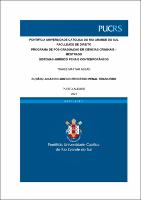| Share record |


|
Please use this identifier to cite or link to this item:
https://tede2.pucrs.br/tede2/handle/tede/10027| Document type: | Dissertação |
| Title: | O (não) lugar do juiz no processo penal brasileiro |
| Author: | Assad, Thaise Mattar  |
| Advisor: | Lopes Junior, Aury Celso Lima |
| Abstract (native): | A presente pesquisa visa explorar o suposto desaparecimento progressivo do terceiro, por meio da virada antropológica, dos lugares e não lugares em Marc Augé e do papel do juiz no processo penal, a fim de analisar se o magistrado está inserido em um não lugar. Assim, se abordará o juiz enquanto sujeito processual, com olhos voltados ao sistema de matriz acusatória, delineado pela Constituição Federal de 1988. Com a delimitação do julgador como não-parte processual, busca-se demonstrar a urgente necessidade da reunião de condições de possiblidades para que o juiz consiga exercer a jurisdição com imparcialidade, afastando-se, totalmente, da iniciativa probatória. Assim, trabalha-se com a ideia de que a imparcialidade é princípio reitor do processo penal guiado por inspirações democráticas e realiza-se breve análise da postura e dos principais argumentos do Tribunal Europeu dos Direitos Humanos (TEDH) em casos emblemáticos. Ainda, se abordará a gestão de expectativas e o discurso manipulador no processo penal, por meio de uma amostra das conversas divulgadas pelo site “The Intercept Brasil” e expostas pela operação “spoofing”. E, por fim, pretende-se demonstrar as aproximações existentes entre a construção da alma coletiva e da perversidade do discurso que reflete a paranoia de uma magistratura lavajatista. |
| Abstract (english): | This research aims to explore the supposed progressive disappearance of the third party, through the anthropological turn, of places and non-places in Marc Augé and the role of the judge in the criminal process, in order to analyze whether the magistrate is inserted in a non-place. Thus, the judge will be approached as a procedural subject, with eyes focused on the accusatory matrix system, outlined by the 1988 Federal Constitution. so that the judge is able to exercise jurisdiction impartially, moving away entirely from the evidentiary initiative. Thus, we work with the idea that impartiality is the guiding principle of criminal proceedings guided by democratic inspirations and a brief analysis of the posture and the main arguments of the European Court of Human Rights (ECHR) in emblematic cases is carried out. Still, the management of expectations and the manipulative discourse in the criminal process will be addressed, through a sample of the conversations disclosed by the website “The Intercept Brasil” and exposed by the operation “spoofing”. And, finally, it is intended to demonstrate the existing similarities between the construction of the collective soul and the perversity of the discourse that reflects the paranoia of a Lavajatist magistracy |
| Keywords: | Não Lugar Papel do Juiz Imparcialidade Objetiva Paranoia No place Role of the Judge Objective Impartiality Paranoia |
| CNPQ Knowledge Areas: | CIENCIAS SOCIAIS APLICADAS::DIREITO |
| Language: | por |
| Country: | Brasil |
| Publisher: | Pontifícia Universidade Católica do Rio Grande do Sul |
| Institution Acronym: | PUCRS |
| Department: | Escola de Direito |
| Program: | Programa de Pós-Graduação em Ciências Criminais |
| Access type: | Acesso Aberto |
| Fulltext access restriction: | Trabalho não apresenta restrição para publicação |
| URI: | http://tede2.pucrs.br/tede2/handle/tede/10027 |
| Issue Date: | 29-Mar-2021 |
| Appears in Collections: | Programa de Pós-Graduação em Ciências Criminais |
Files in This Item:
| File | Description | Size | Format | |
|---|---|---|---|---|
| Thaise_Mattar_Assad_Dissertação.pdf | THAISE_MATTAR_ASSAD_DIS | 1.54 MB | Adobe PDF |  Download/Open Preview |
Items in DSpace are protected by copyright, with all rights reserved, unless otherwise indicated.




